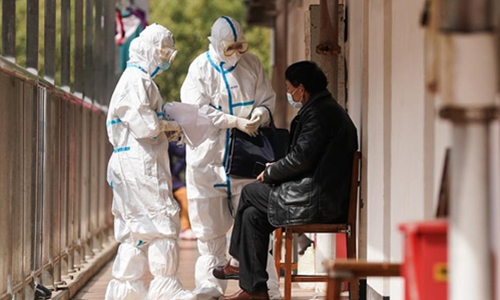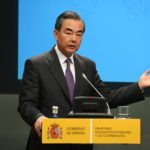People wear protective face masks as they walk down Whitehall in the Spring sunshine on Wednesday in central London. The Bank of England slashed its interest rate to a record low 0.25 percent on Wednesday as part of coordinated emergency action with the UK government to combat the economic fallout from the coronavirus outbreak. Photo:AFP
They also noted that some Chinese commentators and media that lambasted China’s initial response were now rushing to defend herd immunity even as it is criticized by the countries’ own people and World Health Organization (WHO) experts.
The UK chief scientific adviser stoked controversy Friday when he said that about 40 million people in the UK would need to catch the coronavirus to build up “herd immunity” and prevent the disease coming back in the future, the Financial Times reported on Saturday.
Chen Fengying, a research fellow at the China Institutes of Contemporary International Relations in Beijing, told the Global Times, “maybe the UK government believed this was a responsible approach as it can save money for their taxpayers and prevent the NHS (National Health Service) from collapsing, but from a Chinese perspective, this is truly inhuman.”
Countries like the US, the UK and Sweden have enough money and advanced technology, Chen noted.
Shortage of money or technology was no excuse for them to surrender, but they were treating the situation with a “cold blood and extremely rational” attitude, Chen said.
They believed the people killed by COVID-19 are old or sick already, and there was no need “to spend national resources” on them.
Shen Yi, an expert on politics from Fudan University in Shanghai, told the Global Times “This is why the Chinese public are shocked, as they found those Western countries who always lecture and criticize China on human rights issues are actually reluctant to save lives during a pandemic situation.
“They found China, which is a socialist country always criticized by the West, is putting people’s lives at the priority and willing to accept heavy sacrifices in the economy, while some capitalist Western democratic states actually choose to protect economic interests and stock markets first to serve the interests of the capitalists, instead of the health of ordinary people.”
Some media that hold cynical attitude toward the way China handles the fight against COVID-19 are defending the Western states’ approaches, like the herd immunity. They commented that this fits the UK’s national condition, and some “liberalist” Chinese commentators said this is how democratic countries minimize their cost rather than wasting money on mission impossible, a view heavily criticized by Chinese netizens.
Shen said some media or commentators were defending their pro-Western values rather than speaking the truth, which showed their double standard. “When Wuhan local government used a similar approach at the early stage of the outbreak, which was wrong and quickly corrected afterwards, these commentators criticized the practice as irresponsible but when it goes to the UK, they changed their tone.”
Domestic backlash
Many UK people have expressed anger and disappointment with their elected government.
Thomas Sampson, 31, a Wales-based columnist, said herd immunity was “so risky that it cannot be justified and it makes us feel like animals.”
“In theory it requires 60 percent of the UK [38 million people] to be infected to be effective. That means hundreds of thousands of people will die in this ‘experiment’,” he wrote.
Michael Taylor, from Birmingham and who works in Kunming, Southwest China’s Yunnan Province, said “the UK government is ridiculous” and “China has the tested and proven way to control it. Why don’t other governments just follow that?”
He said “I think people in the UK would accept the same measures as China did given the circumstances.”

US political scientist and president of Eurasia Group Ian Bremmer tweeted a question on his Twitter account Sunday: “Who is doing the best job responding to the coronavirus crisis?”
China received 68.2 percent of 27,208 votes as of press time. The EU got 14.3 percent and the US 17.5 percent.
Sampson argued the UK could shut down all non-essential services, but “we have not done anything. I feel abandoned by our government, the only country in the world to do absolutely nothing to protect its citizens.”
There was a lack of civil obedience in Europe and so for this reason, the approach of China would be more difficult to implement here, Sampson noted.
Yue Yue, a Chinese who lives in London, said she felt scared as many people were unaware of the dangerous situation with crowded underground stations and streets. Almost no people wore masks, she noted.
“Local Chinese are trying to save themselves,” Yue said. “They are sharing advice from Chinese doctors and organizing home delivery to supply necessities and also planning to charter airplanes to fly back to China as they don’t trust the UK government’s plan.”
Daniel Miller, a UK national living in China with his family, told the Global Times on Sunday he would not go back to the UK before 2021, as “this is the worst situation for the UK since the Second World War.”
Irresponsible
Herd immunity is not just considered irresponsible for the country’s own people, but also for other countries, said Song Luzheng, a Chinese political scientist based in Paris.
“This is very selfish and irresponsible,” Song said. “In the UK policymakers’ brains, there is no international responsibility.”
Some Chinese experts urged the Chinese government to launch travel bans against the UK and Sweden for their perceived surrender to COVID-19.
Anthony Costello, former WHO director, said Friday that the UK government was out of kilter with other countries in looking to herd immunity as the answer, the Guardian reported.
It could conflict with WHO policy to contain the virus by tracking and tracing all cases, Costello said in a series of Twitter posts.
Tedros Adhanom Ghebreyesus, the WHO director general, said at a mission briefing on Thursday that describing COVID-19 “as a pandemic does not mean that countries should give up. The idea that countries should shift from containment to mitigation is wrong and dangerous.”


